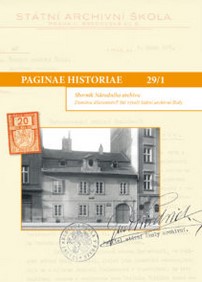STÁTNÍ ARCHIVNÍ ŠKOLA ZA OKUPACE – POKRAČOVÁNÍ V OBTÍŽNÝCH PODMÍNKÁCH
THE STATE ARCHIVAL SCHOOL DURING THE OCCUPATION - CONTINUATION IN DIFFICULT CONDITIONS
Author(s): Jan DobešSubject(s): Archiving, Education and training, Higher Education , History of Education, State/Government and Education, Interwar Period (1920 - 1939), WW II and following years (1940 - 1949)
Published by: Národní archiv
Keywords: The State Archival School; occupation period; Protectorate of Bohemia and Moravia; history of education in Czech Republic;
Summary/Abstract: The article deals with the fate of the Archive School after the proclamation of the Protectorate of Bohemia and Moravia. Its future was uncertain, especially after the closure of Czech universities in November 1939. However, as the concept prevailed that this was not a university, teaching could continue. In the summer of 1940, the VIII course ended, and in the autumn of the same year, the school management asked for permission of another course. In the protectorate’s conditions, the approval process was more complicated, but negotiations with the occupying authorities eventually led to the opening of a new course in March 1941. However, the Office of the Reich Protector set several conditions (limiting the number of students to 15, shortening the study period to two years, supplementing the study plan with subjects related to German history and German archiving). In addition, he insisted that only archivists could teach at school. Under these circumstances, teaching could start from the spring of 1941. The education was not stopped even by a major blow to the school, which was the arrest and subsequent death of its director Bedřich Jenšovský. Jaroslav Prokeš then succeeded him at the head of the school. The school was kept running during the dramatic year of 1942, although as eyewitness Josef Kollmann recalled, it was “in a very uncertain and cramped atmosphere”. IX. course ended at the beginning of 1943. The school then continued to formally continue, although its management did not request a new course. The fact that in the Protectorate years an institution that was mainly engaged in Czech history, taught Czech and provided some form of higher education could operate legally is an interesting phenomenon, still relatively neglected when looking at the Protectorate period.
Journal: Paginae Historiae
- Issue Year: 29/2021
- Issue No: 1
- Page Range: 31-44
- Page Count: 14
- Language: Czech

